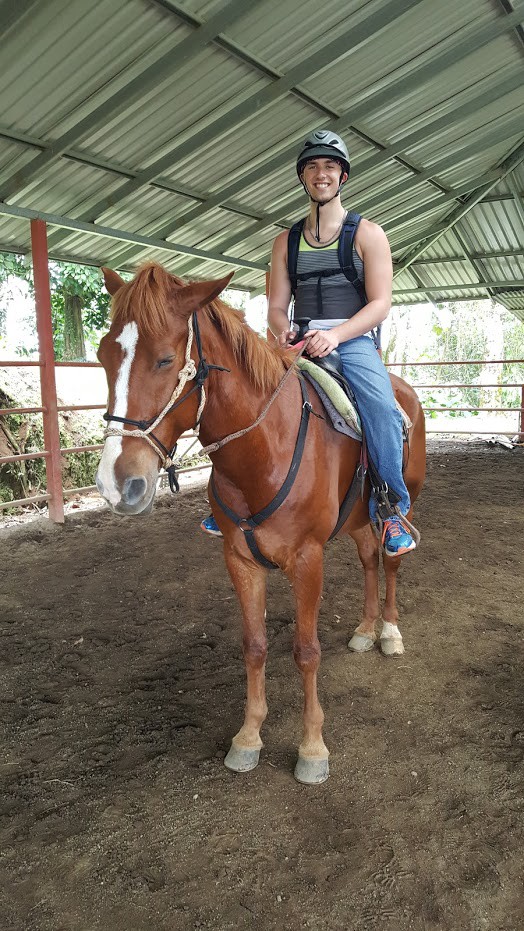A Thought Experiment
What if I told you that you’re probably not thinking long-term enough about your life? No, really. Despite the fact that most of us may think we make decisions and structure our lives planning for the long run, I’ve come to learn that most of us actually live our lives one step at a time, never thinking three or four steps down the road.
For many, each day is spent preparing for tomorrow. Especially in college, the mentality among us is, “I need to study extra-long hours for this exam. Why? So that I can get a good grade. Why? So that I can pass the class. Why? So that I can get a good GPA. Why? So that I can graduate with honors. Why? So that I can be competitive in the job market. Why? So that I get a good job. Why? So that I can make money. Why? So that I can support a family, live a good life, etc. Why?”
As you can probably tell, this dialogue keeps going with one thing building on the next. With a seemingly boundless stream of “whys,” what, exactly, are we working toward? Since these goals are mere means to ends, what is the end we’re striving for? And shouldn’t we spend our days pursuing things that are ends in themselves?
According to German philosopher Immanuel Kant, this is the hypothetical imperative. For many of us, we have our minds set on attaining the financial freedom that comes with a well-paying job. But what if money was no object?
What if you could, right now, do anything you wanted with no financial barriers?
I believe that this thought experiment is important to consider because it encourages us to deeply consider the state of our lives and to think critically about what truly brings us value. Part of following the entrepreneurial mindset is understanding that you are the CEO of your own life and that no one is in control of your destiny but you. How do you want to spend your finite time on this planet of ours? Kant believes that we should seek fulfillment in things that are ends in themselves rather than engage in things that only provide means to ends. People, for Kant, are ends in themselves. I agree with this statement and believe that finding the answer to “what would I do if I had unlimited money?” starts with people.
My Story
Before you might think about what you would do if money wasn’t an concern, it might be helpful to think about what makes you happy right now. There’s a wonderful quote attributed to both William Shakespeare and Pablo Picasso (nobody can come to a consensus on who actually said it) that speaks to this:
“The meaning of life is to find your gift. The purpose of life is to give it away.”
So, for me, while I do not yet believe I have found my gift, I am confident that it involves making people’s lives better. Reflecting on my life so far, this makes perfect sense. I took the stage in high school to perform in plays and musicals (which helped with my public speaking abilities by building self-confidence) specifically because I enjoyed putting on a show for others to come to and enjoy. If I could make an audience both laugh and cry, I did my job. To this day, and since I was a child, I’ve found boundless joy in doing magic tricks for people. While the style and delivery of my magic has evolved through the years, the mantra behind it hasn’t: I enjoy making people laugh and brightening their day.

This is why I build software. I’ve found that, compared to manufacturing physical products, it is tremendously easy to build a product digitally and, for free, push it out to thousands of people. Any challenge I have — big or small — I enjoy working through. I live off the highs that come from positively impacting people and have found great satisfaction in building software to enhance peoples’ lives. I truly believe that I can have a global impact on humanity if I find and pursue the right ideas. But although building software is free, there’s inevitable financial burdens that come with building a team, advertising, and performing legal operations.
One of the problems with problem-solving is finding a solution that’s also a sustainable business. With any problem I attempt to solve, I (unfortunately) must first ask “how can I make money off this solution?” Because, if I don’t think I can, I will surely go out of business. Not only must I identify a business model, but I must also think about raising money from investors. The financial burden tremendously restricts the number of important problems to tackle.
But, if money were no object: the whole playing field changes. I would then be free to pursue any idea I wanted without regard to monetary resources.

If money were no concern of mine, the very first thing I’d do is to travel. While this could seem like a cliché response, I believe that travel is one of the easiest ways to broaden your perspective. Unfortunately, the costs of a plane ticket, ground transportation, food and living, as well as the opportunity costs associated with missing work are often significant boundaries for people.
We live on such an incredible and expansive planet, and there is so much to explore. In fact, there is quite literally all of life to explore (as far as we know, but that’s a conversation for another time). By visiting new places and being exposed to different ways of life, I could learn far more than I would if I never pushed myself outside of my comfortable boundaries. Through this travel, I would begin to view the world through a more cosmopolitan perspective.
While being able to study and grow at a university is spectacular, my biggest concern is the fact that I live in a bubble and am exposed mostly to people that aren’t all that different from myself (as far as the global perspective is concerned). Many of us are twenty-somethings pursuing a higher education and, while having different views and backgrounds, we mostly operate with Western mindsets. But humanity is far more complex than that, to which I cannot even comprehend right now. If money were no object, I’d visit remote parts of the world and hear the stories needing to be told. I believe storytelling is a fundamental part of the human experience, and I want to hear and pass on as many as I can.
Once I feel as though I’ve seen enough of our world’s problems to be sufficiently inspired, I’d begin planning how I would tackle these issues from a technological perspective. With money being no concern, I would freely pursue the problems that people are too afraid to tackle. I would form teams and build high quality products to make people’s lives easier and better on a global perspective. Through my endeavors, I could support sustainable practices and set a good example for others to follow.
Coming Back to Reality
Okay, what now? That plan is all fine and dandy, but that’s clearly not possible because I need to be concerned about money every step along the way. But… could it be possible?
One of my favorite ideation tactics is to first think about how you might solve a problem with unlimited money followed by thinking about how you might solve the problem without any money at all. That’s precisely where the magic happens. By thinking a little more creatively, you can solve problems in ways you never thought possible.
For example, the co-founders of Airbnb found themselves in a money predicament when they were just getting started. They put their heads together and decided to try to raise money by rebranding store-bought cereal into Obama O’s and Captain McCain cereals for the election. To their amazement, they ended up raising $30,000 after expenses. That’s something that no book on “how to build a business” will tell you.
There are plenty of other ways to travel and build companies without money, too. Focus on how you can provide value to people who can help you along your journey. When traveling great distances, think about building partnerships with airlines by finding ways you could add value to them. That’s exactly what the founder of Priceline.com and serial entrepreneur Jeff Hoffman did when he invented the first kiosk for airlines. I had the great privilege of having breakfast with him, and that was one of the many stories he shared. He’s partnered with airlines all over the world and can now be found in a different country every time you visit his LinkedIn profile.

Jeff Hoffman giving his keynote speech on April 13, 2017 at the University of New Hampshire
He also encouraged us to look within our existing networks for support. If you manage to travel to a location you desire and are in need of a place to stay or food to eat, meet people who will let you exchange service-oriented work for their support. Sticking with the theme, find ways you can deliver value in exchange for hospitality. In my own experience, I have found that people always want to help; all you have to do is ask.
While it’s great fun to get creative and imagine your life with unlimited money, it can be disappointing when you “come back to reality” and believe that you can’t actually attain your dreams because money is, in fact, a finite and elusive resource.
Do you want to know the secret? Pursue those ideas anyway. If you are passionate about your future, you can do anything you want by thinking creatively and bringing value to others who can help you. Remember that there are other forms of value than money, and money certainly does not have to become an obstacle if you can think outside the box and never give up.
Wrapping It Up
I encourage you to think long and hard about your own mortality. We all assume we’ll live until we’re 80, 90, or even 100. But the reality is that people young and old die in unexpected ways every day.
If you have big and expensive financial goals, you can start attaining those goals today. Think about what brings you the most happiness in your life and start making a plan. Identify people in your network who you can bring value to and trade services for services. Money does not need to be a barrier to taking action if you don’t let it.
Stop living this rat race focusing one day at a time and start taking action.






